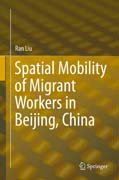
The great migration of farmers leaving rural China to work and live in big cities as 'floaters' has been an on-going debate in China for the past three decades. This book probes into the spatial mobility of migrant workers in Beijing, and questions the city 'rights' issues beneath the city-making movement in contemporary China. In revealing and explaining the socio-spatial injustice, this volume re-theorizes the 'right to the city' in the Chinese context since Deng Xiaoping's reforms. The policy review, census analysis, and housing survey are conducted to examine the fate of migrant workers, who being the most marginalized group have to move persistently as the city expands and modernizes itself. The study also compares the migrant workers with local Pekinese dislocated by inner city renewals and city expansion activities. Rapid urban growth and land expropriation of peripheral farmlands have also created a by-product of urbanization, an informal property development by local farmers in response to rising low-cost rental housing demand. This is a highly comparable phenomenon with cities in other newly industrialized countries, such as São Paulo. Readers will be provided with a good basis in understanding the interplay as well as conflicts between migrant workers' housing rights and China's globalizing and branding pursuits of its capital city.
Audience:
This book will be of great interest to researchers and policy makers in housing planning, governance towards urban informalities, rights to the city, migrant control and management, and housing-related conflict resolutions in China today.
- ISBN: 978-3-319-14737-6
- Editorial: Springer
- Encuadernacion: Cartoné
- Fecha Publicación: 14/04/2015
- Nº Volúmenes: 1
- Idioma: Inglés
